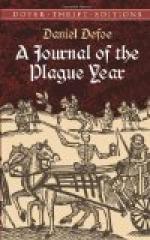The inhabitants of the villages adjacent would in pity carry them food, and set it at a distance, that they might fetch it if they were able; and sometimes they were not able. And the next time they went they would find the poor wretches lie[159] dead, and the food untouched. The number of these miserable objects were[160] many; and I know so many that perished thus, and so exactly where, that I believe I could go to the very place, and dig their bones up still;[161] for the country people would go and dig a hole at a distance from them, and then, with long poles and hooks at the end of them, drag the bodies into these pits, and then throw the earth in form, as far as they could cast it, to cover them, taking notice how the wind blew, and so come on that side which the seamen call “to windward,” that the scent of the bodies might blow from them. And thus great numbers went out of the world who were never known, or any account of them taken, as well within the bills of mortality as without.
This indeed I had, in the main, only from the relation of others; for I seldom walked into the fields,[162] except towards Bethnal Green and Hackney, or as hereafter. But when I did walk, I always saw a great many poor wanderers at a distance, but I could know little of their cases; for, whether it were in the street or in the fields, if we had seen anybody coming, it was a general method to walk away. Yet I believe the account is exactly true.
As this puts me upon mentioning my walking the streets and fields, I cannot omit taking notice what a desolate place the city was at that time. The great street I lived in, which is known to be one of the broadest of all the streets of London (I mean of the suburbs as well as the liberties, all the side where the butchers lived, especially without the bars[163]), was more like a green field than a paved street; and the people generally went in the middle with the horses and carts. It is true that the farthest end, towards Whitechapel Church, was not all paved, but even the part that was paved was full of grass also. But this need not seem strange, since the great streets within the city, such as Leadenhall Street, Bishopsgate Street, Cornhill, and even the Exchange itself, had grass growing in them in several places. Neither cart nor coach was seen in the streets from morning to evening, except some country carts to bring roots and beans, or pease, hay, and straw, to the market, and those but very few compared to what was usual. As for coaches, they were scarce used, but to carry sick people to the pesthouse and to other hospitals, and some few to carry physicians to such places as they thought fit to venture to visit; for really coaches were dangerous things, and people did not care to venture into them, because they did not know who might have been carried in them last; and sick infected people were, as I have said, ordinarily carried in them to the pesthouses; and sometimes people expired in them as they went along.




